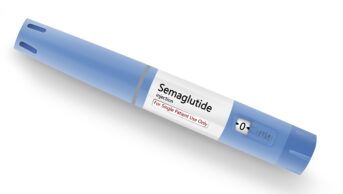
Shutterstock.com
Five drugs approved in the United States for the treatment of obese or overweight adults have been associated with at least a 5% drop in weight after a year, a meta-analysis has shown.
The researchers, led by Rohan Khera, from the department of internal medicine at the University of Iowa Hospitals and Clinics, set out to compare the effectiveness of the five weight loss drugs approved by the US Food and Drugs Administration: orlistat, lorcaserin, naltrexone-bupropion, phentermine-topiramate and liraglutide.
In their comparison, the team analysed the results of 28 randomised clinical trials, which involved 29,018 patients. The patients’ average age was 46 years, of which 74% were women. The median baseline body weight was 100.5kg and the median baseline body mass index (BMI) was 36.1.
They found that all five drugs achieved at least 5% weight loss at 52 weeks but that phentermine-topiramate and liraglutide were associated with the highest weight loss.
The researchers, who published their results in JAMA
[1]
on 14 June 2016, say their findings will be useful to clinicians because there are currently no recommendations about which individual weight loss drug to choose as part of a patient treatment plan.
“Ultimately, given the differences in safety, efficacy, and response to therapy, the ideal approach to weight loss should be highly individualized, identifying appropriate candidates for pharmacotherapy, behavioral interventions, and surgical interventions,” they say.
However, they reiterate that “short-term clinical trials may not provide comprehensive information on the long-term safety of these agents, and prospective post-marketing surveillance studies are warranted”.
The meta-analysis show that a median 23% of patients given placebo achieved at least 5% weight loss compared to 75% taking phentermine-topiramate (odds ratio [OR], 9.22; 95% credible interval [CrI], 6.63-12.85; surface under the cumulative ranking curve (SUCRA), 0.95), 63% taking liraglutide (OR, 5.54; 95% CrI, 4.16-7.78; SUCRA, 0.83), 55% taking naltrexone-bupropion (OR, 3.96; 95% CrI, 3.03-5.11; SUCRA, 0.60), 49% taking lorcaserin (OR, 3.10; 95% CrI, 2.38-4.05; SUCRA, 0.39), and 44% taking orlistat (OR, 2.70; 95% CrI, 2.34-3.09; SUCRA, 0.22).
All weight-loss drugs were associated with “significant excess weight loss” compared with placebo at one year – phentermine-topiramate, 8.8kg (95% CrI, -10.20kg to -7.42kg); liraglutide, 5.3 kg (95% CrI, -6.06kg to -4.52kg); naltrexone-bupropion, 5.0kg (95% CrI, -5.94kg to -3.96kg); lorcaserin, 3.2 kg (95% CrI, -3.97kg to -2.46kg); and orlistat, 2.6 kg (95% CrI, -3.04kg to -2.16kg).
Commenting on the research, the National Institute for Health and Care Excellence (NICE), which provides guidance on which drugs should be used on the NHS in England, says: “For all guidelines, any significant, robust new evidence would be considered and could lead to an early review.”
According to NICE guidance, drug treatment for obesity should only be considered when people have failed to reach their target weight or have plateaued “on dietary, activity and behavioural changes”.
The guidance adds that orlistat, which is the only weight loss drug approved in England and Wales as part of an obesity management plan, should only be prescribed for adults who have a BMI of 28 kg/m2 or more with associated risk factors or a BMI of 30 kg/m2 or more.
David Haslam, chair of the National Obesity Forum, a UK charity that raises awareness about obesity, says that although orlistat is recognised by the NHS its actual usage is “very low”.
“Saxenda (liraglutide 3mg) for obesity with or without diabetes is approved in Europe, but has not yet been launched by NovoNordisk,” he adds. “Mysimba (naltrexone/bupropion combination) similarly is approved but not launched.
“Both are highly effective weight loss drugs, and it is very frustrating not to be able to use them in the UK, but to have to watch the [United States] prescribe them freely.”
References
[1] Khera R, Murad MH, Chandar AK et al. Association of pharmacological treatments for obesity with weight loss and adverse events a systematic review and meta-analysis. JAMA 2016;315:2424-2434. doi: 10.1001/jama.2016.7602


